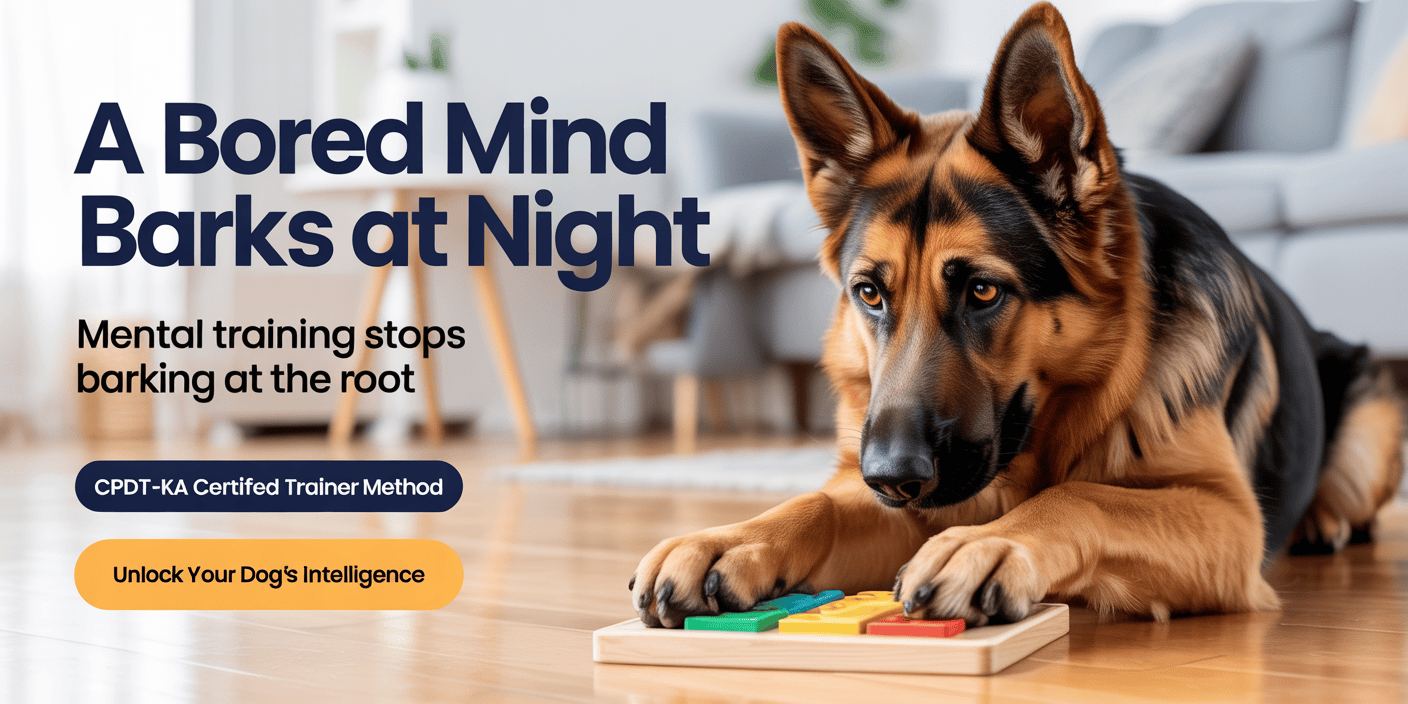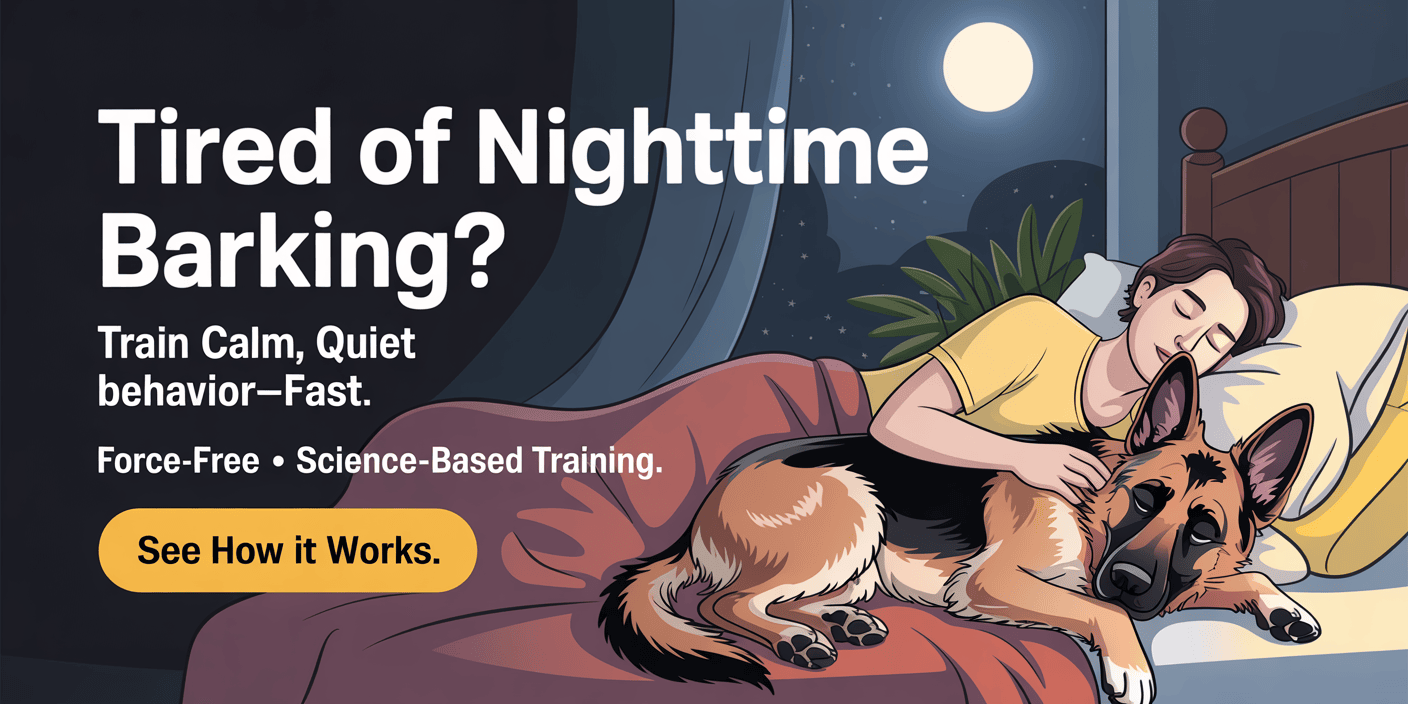As a lifelong German Shepherd owner and certified dog trainer, I’ve faced many barking issues with this breed. People often think German Shepherds bark a lot because they’re loud dogs. But, there’s more to it. German Shepherds are indeed one of the most vocal breeds. But their barking can be due to many reasons. With the right strategies, you can lessen the noise at night. So, how to stop german shepherd from barking at night?
My own German Shepherd, Oakley, began barking nonstop at night early on. It was a big problem for our home, and I felt stuck. But my training experience and research led me to a solution. In this article, I’ll share six easy tips to help you stop your German Shepherd from barking at night. I’ll also explain how to change their behaviour gently and effectively.
Key Takeaways
- German Shepherds are one of the most vocal dog breeds, but their barking can be managed with the right techniques.
- Understanding the underlying reasons for your German Shepherd’s barking, such as breed-specific traits, fear, anxiety, or attention-seeking, is crucial to addressing the problem effectively.
- Implementing a comprehensive behaviour modification plan that includes preventing triggers, desensitisation, and teaching alternate behaviours can help reduce nighttime barking.
- Providing adequate physical and mental stimulation, as well as addressing any underlying health or anxiety issues, can also contribute to a quieter, more settled German Shepherd.
- Seeking the guidance of a professional dog trainer or behaviourist can be invaluable in tackling persistent barking problems in German Shepherds.
Understanding the Reasons Behind Your German Shepherd’s Barking
How to stop german shepherd from barking at night tips
As a German Shepherd owner, you might notice your dog barking a lot for different reasons. It’s important to understand why your dog barks to help manage this behaviour.
Breed-specific Function
German Shepherds were bred to herd animals. They bark to alert their pack (you and your family) to dangers or to call everyone together.
Fear and Anxiety
German Shepherds may bark due to fear or anxiety. This can happen when they meet new people, animals, or places. Early socialisation can reduce this barking.
Excitement and Attention
Your German Shepherd might bark when they’re excited, like when they see you or play. They also bark to get your attention because they love interacting with you.
Habit and Boredom
German Shepherds might bark out of habit or boredom if they don’t get enough to do. This can happen if they get attention for barking.
Knowing why your German Shepherd barks is crucial for finding the right solution. It could be their breed, fear, excitement, or habit. Fixing the cause can help manage their barking.
Every dog is different, so their barking reasons can vary. Watch your German Shepherd’s behaviour and body language to figure out what triggers their barking. Then, use training, enrichment, and positive reinforcement to help them.
Decoding Your German Shepherd’s Body Language
Understanding your German Shepherd’s body language is key to solving their barking issues. By looking at their “TEMP” (Tail, Ears/Eyes, Mouth, Posture), you can understand their feelings. This helps you find the best way to stop their barking.
German Shepherds are lively and love to bark. Their bark can be as loud as a moving truck’s sound. By watching their body, you can tell if they’re scared, excited, anxious, or upset. This helps you solve the problem and stop future barking.
- A wagging tail often means they’re excited or playful, but a stiff, upright tail might show they’re alert or aggressive.
- Perked-up ears mean they’re interested or paying attention, while flat ears suggest they’re scared or feeling submissive.
- An open mouth shows they’re happy, but a closed, tense mouth might mean they’re stressed or uncomfortable.
- An upright posture usually means they’re calm and secure, but a lowered head and hunched body could mean they’re anxious or unsure.
Learning your German Shepherd’s body language helps you understand their feelings and needs better56. This leads to better communication and less barking.
| Tail | Ears/Eyes | Mouth | Posture |
|---|---|---|---|
| Wagging = Excitement, Playfulness | Perked Up = Interest, Attentiveness | Open, Relaxed = Contentment | Upright = Calm, Secure |
| Stiff, Upright = Alert, Aggressive | Flattened = Fear, Submission | Closed, Tense = Stress, Discomfort | Lowered Head, Hunched = Anxiety, Uncertainty |

Your German Shepherd’s body language shows how they feel. By watching and understanding these signs, you can help them with their barking.
“Understanding your German Shepherd’s body language is the key to solving their barking problems.”
With patience and practice, you’ll get better at understanding your dog. This lets you give them the care they need.
The ABC of Barking Behaviour
Understanding why your German Shepherd barks is key to training and solving the problem. The ABC model helps by looking at Antecedent, Behaviour, and Consequence. This method is great for changing unwanted behaviours like too much barking.
Antecedent (Trigger or Cue)
The antecedent is what makes your dog bark. It could be a sound, like animals, cars, or people passing by, which can make them alert. Dogs can hear four times better than humans, so they pick up on sounds that might make them bark. Sometimes, dogs bark together when one starts, and others join in.
Behavior
The behaviour is the actual barking. It can be caused by being bored, lonely, anxious when separated, sick, or in a new place for puppies. It’s important to know why your dog is barking to fix the problem.
Consequence
The consequence is what happens after your dog barks. It could be getting attention, having its needs met, or the barking stopping the noise. Knowing the outcome helps you figure out why your dog is barking and how to stop it.
Understanding the ABC of barking helps you see what your dog is doing and find a solution. You can use a ‘quiet’ command, give it toys and puzzles, or get help from a pro to manage the barking.
Learning the ABC approach is key to fixing your German Shepherd’s barking and having a better relationship with your dog.
Identifying Your German Shepherd’s Barking Triggers
Finding out what makes your German Shepherd bark is key to solving the problem. These dogs are very popular in America, so owners need to know why they bark. German Shepherd puppies start barking around 7-8 weeks old, but some wait a bit longer. They can make different sounds like barking, growling, and whining.
To figure out what makes your German Shepherd bark, watch for patterns before they bark. Eating fewer carbs and grains might help calm them down by controlling their blood sugar. Not using a kennel can also lessen their anxiety. Doing fun activities at bedtime, like giving them a beef neck bone, can make them see bedtime as positive.

Things that often make German Shepherds bark include the garbage truck and mail carriers. Playing games like fetch can help them release stress. It’s a good idea to take them to the vet to check for health issues like thyroid problems or Addison’s disease.
Knowing what triggers their barking helps you find ways to stop it. Working with your dog to build trust and reduce anxiety is a long but rewarding process. It takes a lot of effort from the owner, but it’s important for the dog’s happiness.
Every German Shepherd is different, so you’ll need a plan that fits them. Switching to a raw diet can help balance their hormones and behaviour. Stories from owners show how patience, commitment, and tailored training are key to helping your dog.
How to stop german shepherd barking at night
As a German Shepherd owner, dealing with your dog’s night barking can be frustrating. But there are ways to quiet your dog and help everyone sleep better. These methods can make nights peaceful for you and your dog.
First, make sure your German Shepherd gets enough exercise and mental stimulation during the day. Dogs sleep about 11 hours a day, so they need lots of activity to stay calm at night. It’s also key to socialise your dog well. This helps them ignore things that might make them bark, like people or other dogs.
Don’t give your dog treats for barking. Teach them to bark on command and then say “quiet” to stop it. Giving them toys and puzzle games can also keep their mind busy and reduce barking.
Creating a calm environment can also help. Close the blinds, play soothing music, and keep outside noises down to lessen anxiety and barking. Getting help from dog walkers, trainers, or daycares can also be a big help in controlling your dog’s barking.
It’s vital to find out why your German Shepherd is barking, like if they’re anxious, bored, or sick. Using these tips together can stop your dog from barking at night. This will make your home quieter and more peaceful.

In the UK, a barking dog can be seen as a ‘statutory nuisance’ under the Environmental Protection Act 1990. Owners could be fined up to £5,000 if their dog’s barking bothers the neighbours. It’s important to follow the law and be a responsible dog owner.
Whether your German Shepherd is a puppy or an adult, these strategies can help make your home quieter. By tackling the reasons behind the barking and using good training, you can manage your dog’s barking. This will improve your relationship with your furry friend.
Determining the Payoff for Your German Shepherd’s Barking
It’s key to understand why your German Shepherd barks to fix the issue. If your dog barks and the stranger leaves, that’s a good thing for them. Or, if they bark to get your attention and you give it, that’s also positive.
Figuring out why your German Shepherd barks helps you tackle the problem. You can then use training and changes in their environment to help. This is better than just trying to stop the barking without solving the root cause.
- Watch your German Shepherd to see what happens after they bark. Does the problem go away, or do they get attention or a treat?
- Think about when and why they bark. Is it always the same thing that sets them off?
- Look at the results of the barking. Does it get them what they want?
Knowing why your German Shepherd barks helps you make a plan to stop it. This will be key in changing their behaviour for the better.
“The key to stopping German Shepherd barking is to figure out what’s reinforcing the behavior and then work on changing that consequence.”
Addressing Underlying Issues
Managing your German Shepherd’s barking means looking at the root causes. Things like anxiety, health issues, and pain can make them bark a lot.
Anxiety
Anxiety often makes German Shepherds bark more. Talk to a vet about things like Thundershirts, calming music, pheromone collars, homoeopathic remedies, or meds if needed. A calm space and lots of play and thinking games can also help.
Health Issues
Health problems, like dental issues or allergies, can make them bark a lot, too. Make sure your vet checks for any health reasons for the barking. Fixing health issues often means less barking.
Pain or Discomfort
Pain or discomfort can also make them bark more. Your vet can find and fix pain from things like joint problems or injuries. Fixing the pain can really help with the barking.
Fixing these issues makes life better for you and your German Shepherd. Being patient, consistent, and getting help when needed is important for training and managing their barking.
Implementing a Behaviour Modification Plan
Changing your German Shepherd’s barking habits takes time and effort. But, with the right methods, you can stop this behaviour. The key is to find and fix the main reasons for the barking.
Preventing Triggers
First, figure out what makes your German Shepherd bark. Then, try to stop these things from happening. This could mean blocking their view, keeping them busy with toys, or controlling how they meet visitors. By stopping these triggers, you can stop the barking before it starts.
Desensitisation and Counterconditioning
If you can’t avoid the triggers, try desensitisation and counterconditioning. This means slowly introducing the trigger while giving your dog something good, like treats. Over time, your dog will start to see the trigger as a positive thing, not a reason to bark.
Teaching Alternate Behaviours
Teaching your German Shepherd new behaviours can also help. You could teach them a “quiet” command or exercises that help them control their impulses. This can reduce barking caused by frustration or excitement.
Changing your dog’s behaviour takes time and consistency. But with the right approach, you can make a big difference. By fixing the reasons for the barking and teaching new behaviours, you can make your home peaceful again.
Enrichment and Exercise for a Tired, Happy Dog

To help your German Shepherd stop barking too much, make sure they get enough exercise and mental challenges. A dog that is active and mentally stimulated is less likely to bark a lot, especially at night.
Begin with at least 30 minutes of playtime for your German Shepherd each day, divided into two parts. Use puzzle toys, treat-filled Kongs, and training sessions to keep their minds sharp. These activities will not only wear them out but also keep their brains busy, cutting down on barking from boredom.
For high-energy breeds like German Shepherds, more mental challenges are needed. Try setting up obstacle courses or agility training to boost their fitness and thinking skills. These activities can make them happier, behave better, and sleep better too.
It’s key to make the exercise and enrichment plan fit your dog’s specific needs. Some German Shepherds might need more exercise, while others might prefer more brain games. Watch how your dog reacts and change the activities as needed to keep them happy and well-rounded.
A tired, well-exercised German Shepherd is less likely to bark too much. By mixing physical and mental activities, you can keep your dog happy, healthy, and well-behaved.
🚀 Stop Your German Shepherd’s Nighttime Barking for Good!
Tired of your German Shepherd barking all night? Discover the proven, science-backed solution used by thousands of dog owners to transform their pets into calm, obedient companions—without yelling or punishment!
🔥 Why “Brain Training for Dogs” Works:
- Unlocks your dog’s “hidden intelligence” to eliminate barking, chewing, and other problem behaviours.
- Force-free, gentle techniques based on the latest dog behaviour science.
- Step-by-step games and exercises to mentally stimulate your dog and reduce nighttime anxiety.
- Certified expert guidance from Adrienne Farricelli, a CPDT-KA professional trainer with 10+ years of experience.
- 60-day money-back guarantee—risk-free results!
👉 Don’t wait—give your German Shepherd (and yourself) the peace you deserve! Click here to try Brain Training for Dogs NOW! 🐾
Act fast—this offer won’t last forever! 🚨
Conclusion
This guide has given you key insights on how to handle German Shepherd barking at night. It’s important to know why your dog might be barking, like breed traits, fear, or excitement. By understanding this, you can tackle the main causes.
Learning how your German Shepherd acts and what leads to their barking helps you find the right solutions. It’s also key to fix any issues like anxiety or health problems. A well-planned behaviour change, using techniques like desensitisation and teaching new behaviours, can help.
Make sure your German Shepherd gets enough exercise, fun activities, and a comfy place to sleep. This can make them happier and less likely to bark at night.
Using the tips from this guide, you can help your German Shepherd stop barking at night. With patience and the right approach, you can make your home peaceful for both you and your dog. This will lead to a quieter, more restful night for everyone.
FAQ
What are the common reasons why German Shepherds bark?
German Shepherds bark for many reasons. These include their instincts, fear, anxiety, excitement, and the need for attention. They also bark when they want to play or have developed a habit of it.
How can I decode my German Shepherd’s body language to understand the reason for their barking?
Watching your German Shepherd’s body language is key. Look at their tail, ears, eyes, mouth, and how they stand. This tells you what they’re feeling that makes them bark.
What is the “ABC” model, and how can it help me address my German Shepherd’s barking?
The “ABC” model helps you understand why your German Shepherd barks. It looks at what happened before they barked, their behaviour, and what happened after. This helps you find the best way to stop the barking.
How can I identify the specific triggers that cause my German Shepherd to bark?
To figure out why your German Shepherd barks, pay attention to what triggers it. This could be the sound of the garbage truck, the doorbell ringing, or other dogs barking. Knowing what triggers it helps you deal with it better.
What are some effective strategies to stop my German Shepherd from barking at night?
To stop your German Shepherd from barking at night, make sure they get enough exercise and mental stimulation. Also, don’t give them attention when they bark. Try using toys, puzzle games, and making their environment calmer.
How can I determine the “payoff” or consequence for my German Shepherd’s barking behaviour?
Find out what makes your German Shepherd bark by looking at the consequences. Is it because the trigger goes away or because they get attention? Knowing this helps you make a plan to stop the barking.
What underlying issues should I address to help stop my German Shepherd’s barking?
If your German Shepherd barks a lot, check if they have anxiety, health issues, or pain. A vet can help figure out if there’s a physical reason for the barking.
What are the key steps in implementing a behaviour modification plan to stop my German Shepherd’s barking?
To stop your German Shepherd’s barking, first prevent the things that trigger it. Then, use techniques like desensitisation and counterconditioning to change how they feel. Teach them a “quiet” command as an alternative to barking.
How can I ensure my German Shepherd gets enough exercise and enrichment to reduce their barking?
Make sure your German Shepherd gets enough physical and mental work. Use puzzle toys, train them, and play tricks to keep them busy. This helps them not bark as much, especially at night.






